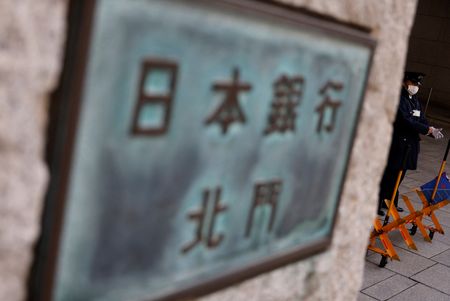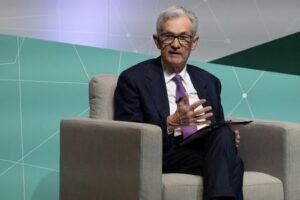By Leika Kihara
TOKYO (Reuters) -The Bank of Japan on Wednesday amended rules for a funds-supply market operation to make it usable as a tool for preventing long-term interest rates rising too much, in a show of resolve to maintain its yield curve control (YCC) policy for the time being.
Under the amended rules, the central bank can make both fixed-rate and variable-rate loans of up to 10 years’ duration against collateral to financial institutions.
Before the change, the BOJ was able to offer funds for as long as 10 years only as fixed-rate loans. By adding variable-rate loans, it can use the funds-supply operation as a tool to control the shape of the yield curve, analysts say.
“The BOJ shall determine the interest rate of each loan in order to encourage the formation of a yield curve that is consistent with the guideline for market operations, taking into account market prices of Japanese government bonds for each maturity,” the central bank said in a statement.
After announcing the new rules, the BOJ said it would offer five-year loans under the funds-supply operation with a duration of between Jan. 24, 2023 and Jan. 24, 2028.
The BOJ has struggled to defend a 0.5% cap on the 10-year bond yield set under YCC, as investors have sold off bonds in anticipation of a tweak to its ultra-loose monetary policy.
The rule change for the funds-supply operation was announced in tandem with the central bank’s decision on Wednesday to make no changes to YCC, including the yield cap.
Takafumi Yamawaki, head of Japan rates research at J.P. Morgan Securities, said the amendment would allow the BOJ to offer five-year loans with the funds-supply operation, a move that would help push down five-year swap rates.
“This was probably Governor Haruhiko Kuroda’s way of ensuring his successor won’t have to deal with deteriorating market function from the outset,” Yamawaki said.
“It doesn’t mean the BOJ won’t need to tweak YCC, which is showing some limits. But any tweak can be done by the new governor after scrutinising economic conditions,” he said.
(Reporting by Leika Kihara; Editing by Christopher Cushing and Bradley Perrett)





